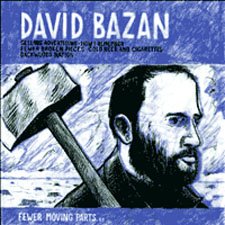THE NEW AMSTERDAMS
STORY LIKE A SCAR
REVIEWER: MM

There was this guy from Camp IAWAH who I really got along with well.
We gelled. He only worked there for one summer. His name was Keith,
but more affectionately, he was known as Dr. Nye as he was really into
Science. Anyways, when he first told me about the Get Up Kids, I really
wanted to like them - because I thought Keith was a cool guy - but I couldn't.
Something just grained on me about Matt Pryor's whiny voice.
And now, here I am, almost 6 years after the fact, writing a review on The New
Amsterdams - an undercurrent side project of Pryor's for years and now his
main focus with the end of the Get up Kids. (I did become a Get Up fan, just
so ya know.)
From the opening, haunting melody of 'Death Of Us', Pryor establishes himself
as someone who has played the indie scene, but who has wizened with time.
The tune of it almost makes you want to watch a Clint Eastwood western as the
subtle harmonica and acoustic guitar laze along through a myriad ghost town of
relationship struggle-based lyrics. And so I listened on, flowing right into the second
and most popular track from the record 'Turn Out The Lights', showing a deeper
and subtler sensitive side of Pryor - sort of melanchoic and reflective but still
somehow upbeat with a few handclaps and the hope for connection in the lines -
'I've been wrong but it's alright / There've been long and lonely nights /
I was lost till I found you / Turn out the light, I'll stay if you want me to'
What impressed me was also TNA's ability to waver into some harder, more
electric songs like 'Bad Liar' and 'Past The Pines' that showed to be fairly short
in length, but still power-packed with some distortion and emotional/passionate
vocalizing. Pryor has an uncanny ability to make seemingly simple lyrics cover several
layers of symbolic reference, mainly in the area of failed friends and lovers.
This shows clearly in 'Bad Liar' in the idea of letting bygones be bygones
and how an image of someone is not necessarily who they are:
'Let's call it off, let's take the memories and run /
I'll be the villain, the man with the smoking gun /
I guess this is goodbye So have a nice life /
See you at the replay lounge'.
Keeping true to Pryor's musical style, the feel of this album is a little downtrodden
but still mysteriously upbeat and optimistic as many of the songs have a real
'live off the floor' type sound, without excessive layering, making you feel
like the band had a hoot of a time recording this work. Probably the most
outstanding song to me, of Story Like A Scar, is 'A Small Crusade'. This work is
probably one of Pryor's most achieving and stretching, both musically
and lyrically (again, simplicity masking complexity) as you get the feel of
the songwriter wandering through fields, on a journey of many kinds, to
discover his true essence of self, away from the influences of
people and organized religion:
'You're always a pilgrim leading a small crusade to find the essential
not a missionary or a guidethe past is part of this to cast aside'.
Though I need to give this album a definite few more listens before I've
made up my mind, I think for all of Pryor's genius, the listener is somewhat
left hanging and wanting more. Sure, the reprise of 'Turn Out The Lights'
is fun and catchy like a gospel choir singing old school Jesus-by-the-river
hymns, but it's not enough to earmark the whole story that is, in fact, like
a scar. Plus, with only nine songs (ten if you count the reprise), one wonders
what was left on the cutting room floor and why we couldn't hear the 'whole'
story. 7/10




